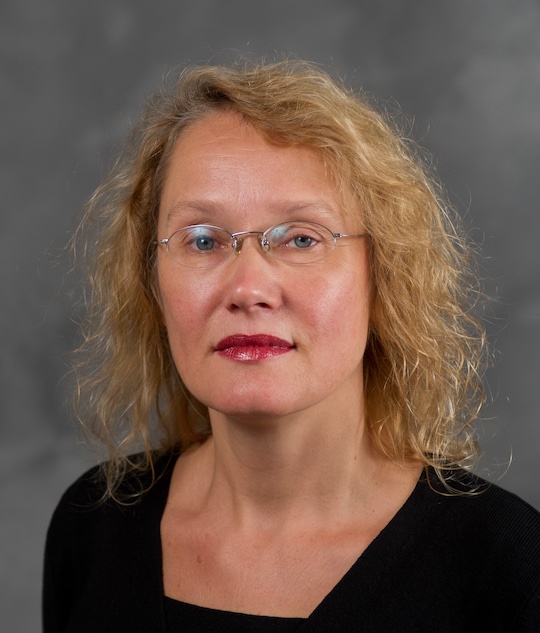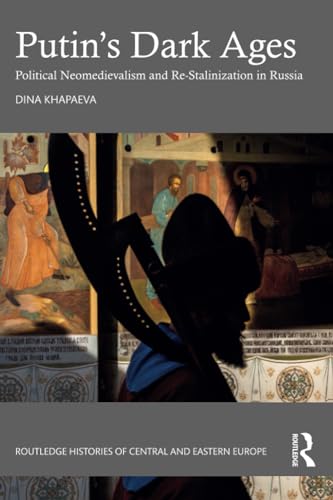
However you feel about Game of Thrones, The Lord of the Rings, or the Renaissance fair, you probably know that the modern imagination is smitten with all things medieval — from architecture and fashion to political structure and power dynamics.
This phenomenon, called neomedievalism, seems harmless enough. But Georgia Tech School of Modern Languages Professor Dina Khapaeva argues that in Russia, cultural fascination with medieval society and sensibilities is being used “to aggressively reshape the nation’s understanding of its history and identity.”
Khapaeva, an expert in Russian studies, historical memory, cultural studies, and death studies, is also the author of The Celebration of Death in Contemporary Culture (Univ. of Michigan Press, 2017) and Nightmare: From Literary Experiments to Cultural Project (Brill, 2013). Her research explores the intersection of popular culture, historical memory, and political strategy.
Khapaeva says the use of popular medieval imagery, stories, and tropes plays key a role in a political strategy she calls “political neomedievalism.” She discusses how this strategy is influencing Russian politics, culture, and historical memory in her new book, Putin’s Dark Ages: Political Neomedievalism and Re-Stalinization in Russia.
“Our flirtation with medieval themes is profoundly marked by the crisis of democracy,” says Khapaeva. “The gap between the aesthetic and the political is closing in Putin’s Russia, and we are seeing a call for a return to the so-called ‘Russian Middle Ages’ — a theocratic monarchy, a society of estates, and an empire in which order is maintained through terror and oppression.”
Rehabilitating the Images of Ivan the Terrible and Joseph Stalin
Ivan th e Terrible, or Ivan IV, ruled Russia from 1533 until 1584, first as the Grand Prince of Moscow, then as the country’s first tsar. His reign was marked by mass executions and purges by his Oprichniki or secret police, the displacement of thousands, and other atrocities.
e Terrible, or Ivan IV, ruled Russia from 1533 until 1584, first as the Grand Prince of Moscow, then as the country’s first tsar. His reign was marked by mass executions and purges by his Oprichniki or secret police, the displacement of thousands, and other atrocities.
In Russian film and media of the past 20 years, Khapaeva says there is a deliberate and ongoing effort to revise the tsar’s story. Rather than causing devastation and suffering, in this new narrative, Ivan IV brought order to a chaotic society and greatness to a budding empire.
“In Russian history, there has never been a single monument to Ivan the Terrible — until 2016,” says Khapaeva. “That year in the city of Oryol, the Russian Minister of Culture under Putin supported the creation of a huge, bronze statue of Ivan the Terrible.”
The monument sparked a great deal of controversy, with proponents arguing that the tsar had been unfairly portrayed by European historians. At the unveiling ceremony, the city’s mayor compared Ivan IV to Putin, lauding both as “great and most powerful leaders” who “forced the whole world to respect Russia and to reckon with us.”
In spite of outcry by historians and others, Khapaeva says two additional monuments to Ivan the Terrible, as well as several others to Stalin, have been erected since 2016.
Revising History: Stalin’s Rule
Popular culture’s efforts to cast Ivan IV in a favorable light can be traced to Joseph Stalin’s era, with director Sergei Eisenstein’s 1944 film Ivan the Terrible, Part I. The film depicted only the early part of Ivan IV’s rule, prior to his creation of the Oprichniki — a secret police hand-selected by the tsar to carry out mass executions and other atrocities. The film, which showed Ivan IV as a relatable protagonist, won Stalin’s approval.
Along with a rehabilitated image of Ivan the Terrible, Khapaeva says a new and favorable image of Joseph Stalin is foundational to the antidemocratic political narrative in Russia.
“The memory politics of political neomedievalism are very much parallel to and supported by the re-Stalinization campaign,” says Khapaeva. “They promote the same values and ideas — that terror is a matter of national pride in Russia. That it is the Russian identity.”
Westernized History and False Nostalgia
Khapaeva notes that the very application of the term “Middle Ages” to Russian history is problematic.
“Strictly speaking, Russia did not have an age of antiquity or a Renaissance, so a reference to the ‘Russian Middles Ages’ may only refer to the resemblance of its pre-17th century society to feudalism,” she says. “Until the mid-19th century, Russia before Peter the Great (1682-1725) was referred to as ‘Kievan Rus,’ Muscovite Rus,’ or ‘Ancient Rus.’”
According to Khapaeva, Russian Westernizers reframed its earlier history with Western ideas, reimagining this period as “the Russian Middle Ages,” which has become a habitual way of speaking about it in Russian parlance.
“Significantly, the catchphrase of post-Soviet far-right anti-Western ideologues is ‘a return to the Russian Middle Ages’,’ and not to ‘Ancient Rus,’ or ‘Muscovite Rus,’” she adds. “And Putin’s educators have altogether eliminated the term Kievan Rus’ from Russian textbooks.”
The removal of these historical terms and the recharacterization of a period of Russian history is more than a historical makeover, Khapaeva argues. She says it’s dangerous.
“This idea of the ‘Russian Middle Ages’ is being used in Russia’s popular film and literature to create false nostalgia for a period of ‘glory through terror’ that never really existed. It’s also being used to suggest that not only is terror justifiable as a political instrument — it is necessary to restore order and glory to Russia.”
Khapaeva’s book, Putin’s Dark Ages: Political Neomedievalism and Re-Stalinization in Russia, was published October 26, 2023 by Routledge. It is available at https://www.routledge.com/Putins-Dark-Ages-Political-Neomedievalism-and-Re-Stalinization-in-Russia/Khapaeva/p/book/9781032571485.
Khapaeva’s work on this book was made possible by one research semester in Spring 2023.
The School of Modern Languages is a unit of the Ivan Allen College of Liberal Arts.
Posted Nov. 27, 2023
